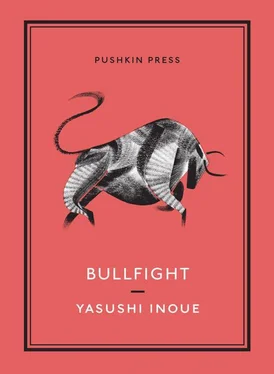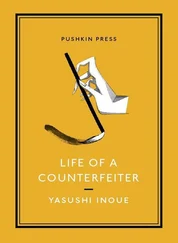Yasushi Inoue - Bullfight
Здесь есть возможность читать онлайн «Yasushi Inoue - Bullfight» весь текст электронной книги совершенно бесплатно (целиком полную версию без сокращений). В некоторых случаях можно слушать аудио, скачать через торрент в формате fb2 и присутствует краткое содержание. Год выпуска: 2013, Издательство: Pushkin Collection, Жанр: Классическая проза, на английском языке. Описание произведения, (предисловие) а так же отзывы посетителей доступны на портале библиотеки ЛибКат.
- Название:Bullfight
- Автор:
- Издательство:Pushkin Collection
- Жанр:
- Год:2013
- ISBN:нет данных
- Рейтинг книги:4 / 5. Голосов: 1
-
Избранное:Добавить в избранное
- Отзывы:
-
Ваша оценка:
- 80
- 1
- 2
- 3
- 4
- 5
Bullfight: краткое содержание, описание и аннотация
Предлагаем к чтению аннотацию, описание, краткое содержание или предисловие (зависит от того, что написал сам автор книги «Bullfight»). Если вы не нашли необходимую информацию о книге — напишите в комментариях, мы постараемся отыскать её.
Bullfight Bullfight
The Hunting Gun
The Counterfeiter
Contains a previously unpublished preface by Inoue himself.
Bullfight — читать онлайн бесплатно полную книгу (весь текст) целиком
Ниже представлен текст книги, разбитый по страницам. Система сохранения места последней прочитанной страницы, позволяет с удобством читать онлайн бесплатно книгу «Bullfight», без необходимости каждый раз заново искать на чём Вы остановились. Поставьте закладку, и сможете в любой момент перейти на страницу, на которой закончили чтение.
Интервал:
Закладка:
When the war ended, B. News decided that the most rational way of dealing with its huge surplus staff was to establish a printing company and an evening newspaper; it moved a significant number of employees to these affiliated companies. Tsugami was immediately tapped to become the new paper’s editor-in-chief. At thirty-seven he seemed slightly young for the post, but clearly no one else had the abundant talent required to create a brand-new kind of publication capable of beating the competition at a time when countless such papers kept sprouting up; and since Omoto, the former film-industry man who had landed in the president’s seat, was a total amateur who didn’t know the first thing about producing a newspaper, whose only selling point was his boldness, what they needed above all was a solid, reliable individual capable not only of working under the president, taking charge of the editing, but also of serving as the central axle around which the paper’s management would revolve. In this respect, too, the impression of thoroughness and caution that Tsugami had given his colleagues had played strongly to his advantage.
When Tsugami assumed his position as editor-in-chief of the Osaka New Evening Post , he first made the bold decision to give the paper a new format, wider than it was long; then, having clearly identified its target readership as urban intellectuals and salarymen, he settled on culture and entertainment as the two subjects for which it would be known, and decided to emphasize satire, irony, and wit in every aspect of its reportage, from its prose style to its coverage and editing. This innovative path he chose for the New Evening Post achieved a certain measure of success: it gained popularity as a different breed of publication among salarymen, students, and the like throughout the entire region, in Kyoto, Osaka, and Kobe, and when the street hawkers came around it was the first to sell out. A paper of this sort had a genuinely attractive freshness in the eyes of readers accustomed to the oafish wartime papers. A certain young professor at Kyoto University, who had been restored to his post after the war ended, commented in a mini column he wrote for the university newspaper that the New Evening Post was “a paper for the slightly unsavory intellectual,” and to an extent he was right. A sensitive poet type would undoubtedly have been able to point out a certain shadow of emptiness, of devil-may-care negligence, of loneliness darkening the pages of a paper that was popular among smart city kids. These were qualities that Tsugami, who gave the paper its editorial direction, carried within himself, though he kept them carefully concealed. The one person who had sniffed out these elements of his personality better than anyone was Sakiko, the woman with whom he had been living off and on for three years now, since the middle of the war, and who kept insisting she was going to leave him, this time she really was, only to let their hopeless relationship keep dragging on and on.
“No one else knows you have this side to you,” she would say when she was feeling happy. “This sneaky, sloppy, unsavory side. No one else, just me.”
Her eyes would shine, as though that element of Tsugami’s character were a trace of the love she had given him. On other occasions, however, she would utter the exact same words but as a criticism directed at her lover.
Tsugami had a wife and two children who were still living in his hometown in Tottori, where he had sent them to escape the bombing; Sakiko had a husband, a college friend of Tsugami’s, who had died at war and whose bones had not yet come home. Tsugami and Sakiko had first gotten involved while the war was still on, and their relationship continued just as it was after the fighting ended. Still, even Tsugami’s colleagues at the newspaper, who usually had such sharp eyes when it came to things like this, had yet to catch wind of their affair — a circumstance that Sakiko interpreted, at least at times, as another sign of his cunning.
Sakiko had first become physically involved with Tsugami about a year after she was notified, by back channels, of her husband’s death. She had been in the habit of going and talking with Tsugami whenever she wanted to discuss her plans for the future, and one summer evening she had gone to visit him at home. He had only just come back from the office, and when she walked around to the verandah as she usually did she found him slumped in a wicker chair inside the house, still dressed in his work clothes, his hat tipped back on his head, taking sips from a glass of whiskey with the attitude of a man who just doesn’t care anymore.
The second he noticed Sakiko, Tsugami leaped up and straightened his jacket, transforming himself into his usual proper, austere self, but by then Sakiko could already feel the blood stirring hotly in her body — a sensation she had all but forgotten. There had been something forlorn in the sight of him there, unguarded, exhausted, that left her oddly moved, touched in a sensuous, moist way. Even after they started sleeping together, she still remembered Tsugami the way she had seen him that evening, and felt that the man she had encountered then was who she loved, that isolated, lonely soul no one else knew, that was somehow being eaten away, emitting a sort of rotten phosphorescence.
Tsugami’s love was not the sort that burned hot and deep. Somewhere down inside him was a core that refused to catch. She could throw herself bodily into his arms and still she would sense that same unbridgeable gap between them. Tsugami’s eyes were unassailably sober, untouched by Sakiko’s heart or by her thirty-year-old body. His were not a lover’s eyes. But neither were they the eyes of a man who would simply toss her aside, like a piece of trash on the road. He gazed at her like an outside observer, watching from a distance, waiting to see how matters would develop — cold, fish-like, and therefore irresistible.
Whenever Sakiko brushed up against this coldness in Tsugami’s heart, so deep he himself seemed unsure how to handle it, the same phrase rose up in her mind: a bad man . But there were times when those emotionless, wicked eyes of his would push themselves toward drunkenness. Sakiko knew that very well. How she loved Tsugami for those eyes: their frenzied, lawless, mournful light. But then she realized that she would never be able to strip them of their sobriety, and her love began, from time to time, to turn itself into a hatred that glistened with sadness.
The fact that Tsugami had let himself be tugged along so easily by the bait Tashiro offered him, by the thought of the bullfight, may perhaps have owed less to his reporter’s instincts than to those sober eyes of his, and the rebellious urge he felt to make them drunk, finally, for once, on something. Sakiko had been right to speak of the hidden “unsavory side” of his personality.
*
The day after Tashiro came to talk about the bullfight, Tashiro convened a meeting in the remodeled building where the Osaka New Evening Post had its offices — a structure in Yatsuhashi that had survived the firebombings. Also in attendance were Omoto, the paper’s president; K., director of the copyediting department; S., advertising director; and Tashiro.
Omoto immediately gave the project his approval. “Terrific idea, I love it. We’ll have to sponsor it ourselves, with support from the town of W. and the Bull Sumo Association — that’s the way to do it. We ought to be able to bring in a hundred and fifty thousand people over three days, I’d say, assuming fifty thousand a day. We’ll go big on publicity, like we brought the bulls over from Spain or something.”
Omoto was so corpulent he looked like a somewhat poorly trained fighting bull himself, and was talking so loudly he was almost shouting, as was his wont when his mood was good. Having raised himself by his own bootstraps from a humble beginning as the owner of a movie theater out in the country to his present position, he had confidence and guts when it came to business matters; he was the sort of man who decided everything on the basis of his own inimitable instincts. Now that Omoto and Tsugami were in favor of the bullfight, no one else could possibly express any real opposition. And so, just like that, the issue was decided. They would bring the tournament that was held at S. Shrine in W. each New Year’s Day up here and hold it in one or the other of the two gigantic, modern baseball stadiums in the Hanshin area. They would have to work on the town and the Bull Sumo Association to make sure to get their support, both in name and in terms of the actual logistics. The tournament would be held over the course of three days in late January, during the off season for outdoor sports. The newspaper and Umewaka Entertainment would split the difference between total expenditure and total income — they would share all profits or losses, in other words. Umewaka Entertainment would not be mentioned in any of the publicity, however; as far as the public knew, the tournament would be carried out solely under the auspices of the Osaka New Evening Post . The expenses that accumulated along the way, until they did their final calculation at the conclusion of the tournament, would be divided with Tashiro taking responsibility for the costs of renting the bulls and transporting them to the stadium while the paper covered whatever costs there were after their arrival, along with those of readying the stadium, doing other preparatory work, and advertising the event. Such were the main points covered in the contract. That night, Omoto and Tsugami took Tashiro to a nice Japanese restaurant in Kyoto. The following night, Tashiro returned the favor by taking them and a few of the paper’s directors to a sukiyaki place in Osaka’s black market and buying everyone round after round of sake.
Читать дальшеИнтервал:
Закладка:
Похожие книги на «Bullfight»
Представляем Вашему вниманию похожие книги на «Bullfight» списком для выбора. Мы отобрали схожую по названию и смыслу литературу в надежде предоставить читателям больше вариантов отыскать новые, интересные, ещё непрочитанные произведения.
Обсуждение, отзывы о книге «Bullfight» и просто собственные мнения читателей. Оставьте ваши комментарии, напишите, что Вы думаете о произведении, его смысле или главных героях. Укажите что конкретно понравилось, а что нет, и почему Вы так считаете.












